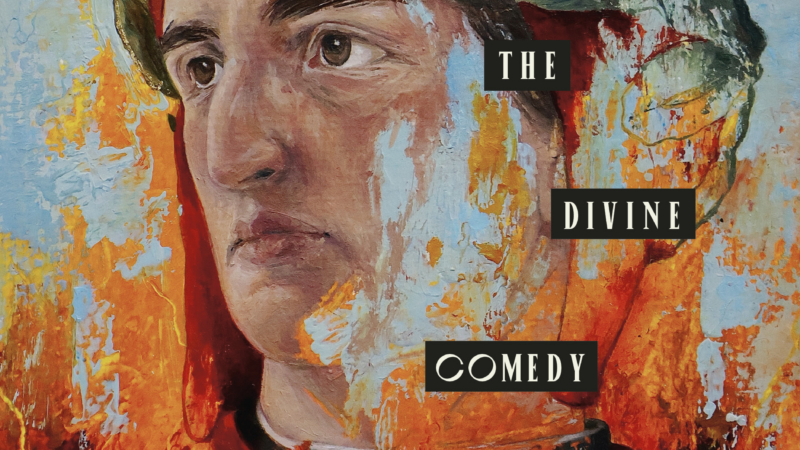There’s a new translation of Dante’s ‘The Divine Comedy.’ Why?
Going to hell is usually a tough break. But the poet Michael Palma doesn’t seem to mind.
In 2002, he published a translation of Dante’s Inferno – the first book in Dante’s epic poem The Divine Comedy. And then this December, Palma took it a step further with a translation of the full poem, including tweaks to his original Inferno. “The meter seemed looser than I thought it should be,” Palma said in an interview. “So I went back.”
For this new translation of The Divine Comedy, Palma wanted to stay true to the rhyme scheme Dante invented for the epic poem – terza rima. The original poem is written in three lines where the first and third lines rhyme, and the second line sets up the rhyme scheme for the following tercet. Here’s how Palma’s version Canto 1 of the book 2, Purgatorio, starts (emphasis added):
To course through bitter waters presently,
My wit’s small craft hoists sails for embarkation
And takes its leave of such a cruel sea.I will sing the second region, where purgation
Cleanses the human spirit of its sin
So that it will be worthy of salvation.
The challenge to approaching a translation of Dante’s original Italian this way is that it means you can’t concentrate on three lines at a time – you have to take larger chunks into consideration. Many other English translations opt for free verse, or a looser rhyme scheme. “And many of them are quite fine,” said Palma. “But I think without reproducing the rhymes, you’re certainly losing a lot of the sound value. You’re losing the music of the poem.”
“And – perhaps this will sound a bit, you know, anal, – but just from a purely literal point of view, you’re not showing the reader what Dante actually did in his poem,” he said.
It’s a tough feat, but Palma isn’t the first to attempt it. So, what’s the value in translating The Divine Comedy yet again? Giving all three parts – Inferno, Purgatorio and Paradiso another rendition?

“Translation is a form of autobiography,” said Joseph Luzzi, professor of literature at Bard College, and author of a number of books about Dante.
“There’s no rules in translation. There’s no rule that says the good translation has to be half accurate, half accessible, or 83 percent accessible, and 17 percent accurate,” he said.
Luzzi just published his own translation of a different work by Dante – Vita Nuova. It’s a lesser known work, much slimmer and more digestible than The Divine Comedy. It depicts a young Dante falling in love with his muse, Beatrice, who dies in the middle of the book.
“To me, the Vita Nuova represents this young poet’s first monumental encounter with death in a way that changes his life,” said Luzzi.
Love, death, sin and salvation – these are big themes that’ll always be of concern to readers. And while translating Dante’s work is a way of keeping his texts alive, his relevance is somewhat self-evident.
“I always tell my students, no book is guaranteed immortality,” he said. “No matter how famous the name, when they stop making sense to contemporary society, people will stop reading them.”
House panel releases report on sexual misconduct allegations against Matt Gaetz
The move is a reversal for the committee, which deadlocked on the issue last month.
9 movie scenes I couldn’t stop thinking about in 2024
From a heart-wrenching epiphany in the drama Tuesday to a meme-able moment in Challengers, these were the lines that critic Aisha Harris has remembered all year.
For young adults, caregiving isn’t just hard. It can shape you for life
Caregiving responsibilities can cut young people off from peers and interrupt their emerging life story. And there's been little research or support directed at this group. That's starting to change.
‘We are not California’: New Jersey dealers push back on electric truck rules
Vehicle dealers are pushing back on rules that would increase the number of electric trucks sold in New Jersey. It could be a preview of a brewing fight over state rules about cars.
The fun — and confusion — of celebrating Christmas and Hanukkah on the same date
Christmas and Hanukkah rarely fall on the same date, but this year they do. One mixed-faith family in Oakland, Calif., doubles down for double whammy holiday.
What the Israel-Hezbollah war did to Lebanon’s cultural heritage sites
Part of a Crusader castle crumbled. An 18th century minaret felled. Church mosaics burned. Archaeologists are assessing damage to UNESCO World Heritage Sites from Israeli strikes on Lebanon and Syria.





